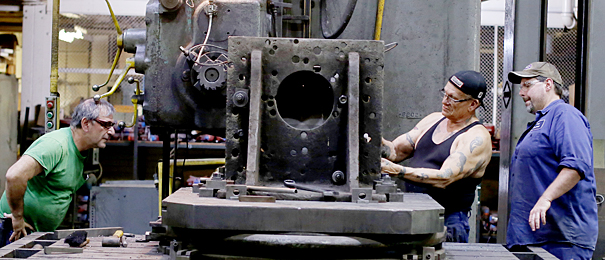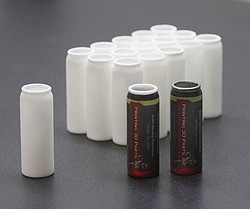Growth still possible for Valley industries

By KALEA HALL
khall@vindy.com
Future of industry in the Valley

What does the future hold for Youngstown? Current and former Vindicator staff share their thoughts on industry in the Valley.
YOUNGSTOWN
Andy Kostecki would get an eerie feeling when he went into the skeletons of former steel mills.
Kostecki, a welder and fabricator for Casey Equipment, would travel throughout the U.S. to find old machinery inside the mills, bring them back to the former Youngstown Sheet & Tube Co.’s Campbell Works and fix them up.
“I get it [the eerie feeling] when I go out on the road to tear stuff out of these old mills,” he said. “I am going around the country and taking down what made this country great.”
VIDEO: Future of industry in the Valley
Casey Equipment owns 11 buildings and 110 acres at the former Campbell Works. Nineteen employees work in what was the steel mill’s machine shop. Casey buys and sells steel mill equipment. The workers rebuild direct-current crane motors, brakes and crane controls. A road crew goes out and removes the equipment Casey buys from shuttered mills.
Inside the building where Kostecki works, decades-old machines, including lathes and horizontal mills, still work.
“Most of this machinery in here has been in here since the 1930s,” Kostecki said.
A majority of the floor inside the machine shop is made up of greasy black wooden blocks. The air is thick with the smell of manufacturing.
Kostecki never worked for the mills back in the day, but he had several opportunities to get a job there. The intense and chaotic schedule of the job didn’t sound pleasing to him.
“I was shocked,” he said when the mills closed, beginning in 1977. But he also knew the companies weren’t investing in the plants to update them.
Inside the machine shop, Kostecki and his co-workers use the old machinery to fix what equipment they find in other mills.
“It’s a shame to see where it’s gone,” Kostecki said of the steel industry. “I’d like to see President Donald Trump doing what he wants to do. He’s working hard at it. He just doesn’t have the cooperation he needs.”
REVIVAL OF YOUNGSTOWN
Forty years later and Youngstown has yet to recover from the collapse of the steel industry that started Sept. 19, 1977, with Sheet & Tube’s announcement it would end a majority of its steel production at the Campbell Works.
“We haven’t recovered entirely because we are still trying to figure out what can replace those industries,” said Mekael Teshome, PNC Bank economist.
The population loss is visible proof the area hasn’t made a full recovery. The Vindicator reported in March that the 2016 population decline was the largest in the five-county Mahoning and Shenango valleys region since the 2010 census.
Mahoning, Trumbull and Columbiana counties in Ohio and Mercer and Lawrence counties in Pennsylvania lost 6,384 people between July 1, 2015, and July 1, 2016.
“If we are successful, which I think we will be, we will see sustaining population and that creates vibrancy,” Teshome said.
To help in recovery, the workforce should have the skills and training necessary for the job, the global market should be tapped into and entrepreneurship should be supported, Teshome said.
“It’s not always about attracting the big block bluster investment that can help,” Teshome said. “Every challenge is an opportunity. The transition from old manufacturing to new manufacturing is never easy. We are focused on growing through exports and entrepreneurship. I believe we can grow the [manufacturing] sector, but it’s not going to look how it did before.”
WHAT NOW?
The Mahoning Valley’s economy is moving from a manufacturing of goods economy to a service-based economy.
“We see that everywhere,” Teshome said. “That has to do with changes in the global economy.”
Manufacturing is still a major aspect of the local economy, but it has changed over time.
Technological innovation has led to needing fewer people to make the same amount of a product and producing a better-quality product.
Auto and metals manufacturing are two top industries in the Valley, but the manufacturing makeup here is diversified.
“There’s a lot of manufacturing and it serves a whole variety of industries,” said Sarah Boyarko, senior vice president of economic development for the Youngstown/Warren Regional Chamber.
The chamber has recently seen an increase of inquiries into warehouse distribution deals.
“In looking back in the lessons we learned, No. 1 is for us is to not only create jobs but continue to diversify,” Boyarko said.
Today, there are about 4,000 primary steel jobs in the Youngstown Warren MSA, which includes Mahoning, Trumbull and Mercer counties, according to the U.S. Bureau of Labor Statistics.
In Youngstown, France-based Vallourec has Vallourec Star, Vallourec USA Corp. and VAM USA. Locally, the company has about 675 employees.
Vallourec Star operates where the former Sheet & Tube Brier Hill Works operated on Martin Luther King Jr. Boulevard. Vallourec Star makes seamless steel pipe for the oil and gas industry.
“The steel industry has evolved over the years, and Vallourec continues to build upon our rich heritage in the Mahoning Valley,” said Jean Gaetano, Vallourec spokeswoman in a statement.
“Our team members have been the key to our success; because of them our Youngstown operations are a center of excellence for pipe making in North America.”
HOW THEY SEE IT
Throughout the week, The Vindicator has talked with steel workers and steel supporters about industry today.
Frank Castro, 72 of Poland, who worked at the Campbell Works for 13 years, doesn’t ever foresee the massive manufacturing plants coming back.
“Hopefully the [chill] can plant will do some good,” Castro said of the $20 million West Coast Chill complex under construction on the East Side. That plant is expected to employ 257 workers.
Darryl Parker, 67 of Warren, the last president of United Steelworkers Local 1375, which represented workers at the now shuttered RG Steel plant, also doesn’t see plants employing thousands like RG did ever coming back.
“Automation took over,” Parker said. “We need blast furnaces. We need to concentrate on putting them back online.”
Staughton Lynd, 87 of Niles, a labor lawyer who represented the United Steelworkers union in a lawsuit against U.S. Steel in an effort to keep the steel plant open and save jobs, sees the only significant economic development since the collapse of steel as the building of prisons in the Valley.
“I just think there’s a lot of bubble gum about the impending economic revival of Youngstown,” Lynd said.
 43
43
